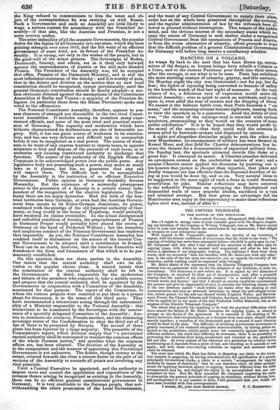THE COPYING TELEGRAPH.
TO THE EDITOR OF THE SPECTATOR.
6 Tfarerstock Terrace, Hampstead, 28th June 1848. SIR-I regret to occupy more of your valuable space with the dispute respect- ing my invention of the Copying or Writing Telegraph; but as Mr. Bain's second letter in your last number denies the correctness of my statements, I feel obliged to trespass on your indulgence again.
With respect to Mr. Carpmael's opinion on the novelty of my invention, I repeat, with the utmost confidence of correctness, that his words to me were, "The copying of writing has never been attempted before—the field is quite open to yen." Mr. Carpmael said this after I had directed his attention to Mr. Barn's plan for copying types, with which he seemed well acquainted, and after he had been shown a specimen of my telegraphic writing. 'fbe inference I drew from those words, that my invention "does not interfere with Mr. Bain's nor with any other," may in the eyes of the law seem too extensive; yet, as regards the novelty of the invention, surely nothing could be expressed more strongly.
Mr. Bain's denial of the statement that the Electric -Telegraph Company have entered into an agreement with me for the adoption of my invention, is most ex- traordinary. The document is now before me. It is signed by two directors of the Company, as required by their act of incorporation; and, after a preamble stating that the nature of my invention consists "in a method of reproducing written words and figures," and that I should on certain conditions communicate the process and give an opportunity of trial, it contains the following clause—that if the two directors named "shall within six weeks after the making of such communication and trial as aforesaid determine to adopt the said alleged inven- tion, letters patent for the sole use thereof within England, Wales, and Berwick. upon-Tweed, the Channel Islands and Colonies, Scotland, and Ireland, shall forth- with be applied for in the name of the said Frederick Collier Bakewell, but at the expense of the Electric Telegraph Company." The denial that gravity has anything to do with the practical difficulties which have caused the failure of Mr. Bain's invention for copying types, is almost as strange as the denial of the agreement. It is essential to the working of Mr. Bain's invention that two pendulums, at a distance from each other, should vibrate exactly together; a variation of the thousandth part of a second in each vibration would be fatal to the plan. The difficulty of attaining synchronous movements is greatly increased, if not rendered altogether insurmountable, by having points at- tached to the pendulums, which points must rub constantly against uneven and different surfaces; but could this difficulty be overcome, there is no possibility of preventing the velocities from being accelerated and retarded as the pendulums fall and rise. At every instant of the vibration of a pendulum its velocity varies, accelerating as it descends from a point of rest, and retarding as it ascends to rest again; and with these ever-varying velocities no regular and accurate marks could be obtained.
The error into which Mr. Bain has fallen in disputing my claim to the inven- tion consists in supposing, by having introduced into the specification of a patent, principally for electrical clocks, a claim to a certain "arrangement for copying surfaces by means of electricity," that he can therefore claim all other arrange- ments for applying electrical agency to copying, however different from his these arrangements may be, and though the object to be accomplished was not con- templated by him. Had Mr. Bain consulted Mr. Carpmael respecting his claim to monopolize the general principle of copying by electricity, without having him- self accomplished it in any manner or form, I feel persuaded that you would not have been troubled with this correspondence. I remain, Sir, your most obedient servant, F. C. Beitswsu.


























 Previous page
Previous page